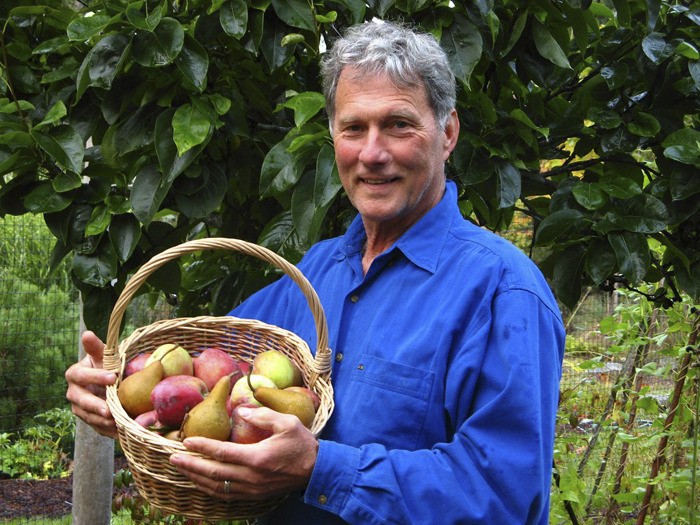By Cali Bagby
Randall Waugh didn’t even know a Gleaners Group existed, but he knew that he didn’t like the idea of ordering vinegar all the way from California, — not with all the potential apple production he believes could be made on Lopez.
One of the key ingredients in Waugh’s Lopez-made Chicaoji Chili Sauce is apple cider vinegar.
So when he heard several Lopezians were collecting fruit from unpicked trees, he joined the team of volunteers calling themselves the Gleaning Group.
Waugh said, there are orchards on Lopez no longer maintained, overgrown with grass and forgotten, but still producing fruit — just waiting to be picked.
The Society of St. Andrews, an organization operating mainly in southern states, maintains that gleaning originated in a passage in Deuteronomy: “When you reap your harvest in your field and forget a sheaf in the field, you shall not go back to get it; it shall be left for the alien, the orphan, and the widow, so that the Lord your God may bless you in all your undertakings.”
But there are lots of gleaning operations going on with no religious affiliations — just the desire to make use of what is being wasted.
Food waste is responsible for 135 million tons of greenhouse gases every year, or about 1.5 percent of all emissions, says CleanMetrics, which builds software that does life cycle analysis for companies and organizations who want to measure and reduce their environmental impact.
For the Gleaners, collecting fruit that falls off the tree is just one way to offset food waste, and is an alternative way of thinking about the way humans consume or waste food.
Doug Benoliel, co-organizer of the Gleaning Group on Lopez, said this practice is nothing new.
Over his 11 years on the island, he has seen lots of instances where a neighbor offers to pick apples on a nearby tree, but this is the first time he’s put together a formal group.
Unfortunately, this year’s cold spring produced a limited amount of trees with fruit.
“On good years, like last year there were probably enough fruit to fill dozens of boxes, plums, peaches, plums, pears, asian pears,” Benoliel said. “So a lot of fruit goes unused.”
This fall, the group has visited only one property with trees, where they picked two boxes of fruit.
They plan to donate 50 percent of gleaned fruit to any organizations in need including Lopez Fresh, a local food bank, senior lunch program and Locavores.
The Gleaners also want to offer homeowners a portion of the gleaned fruit if the person is unable to, or uninterested in picking fruit themselves.
The clock is now ticking for Gleaners, as the best time to pick fruit off trees is between September and November.
But Benoliel is not too worried, he is looking at not only this year’s fruit, but long term goals.
“The key would be to have individuals who have trees to let gleaners come in year after year, and keep track of how much fruit and what type is available,” he said.
Waugh would like to see the Gleaners eventually make cider with gleaned fruit, which could in turn help his chili sauce business.
He said if people start making apple cider and some of it goes bad, that means it has essentially turned into vinegar, which he could use to make his sauce.
He is also looking into the future; he’d like to see the Gleaners, homeowners and members of the community network to improve the growth of fruit trees on the islands, through pruning or other tree care techniques.
This week, Waugh has a list of people he will be contacting for possible gleaning opportunities and hopeful the Gleaners will be filling boxes with fruit before it’s too late.
“There is so much potential in simple networking, people might know of orchards still producing fruit, but uncared for,” Waugh said. “Taking advantage of that is great.”
Benoliel said they are looking for homeowners with fruit trees that need picking and anyone interested in teaming up with the Gleaning Group.
“If you like fruit and being in a group of like-minded folks giving back to community, you should join,” Benoliel said.
For more info, or a chance to get involved, call 468-3876 or email lopeztamandoug@hotmail.com.




